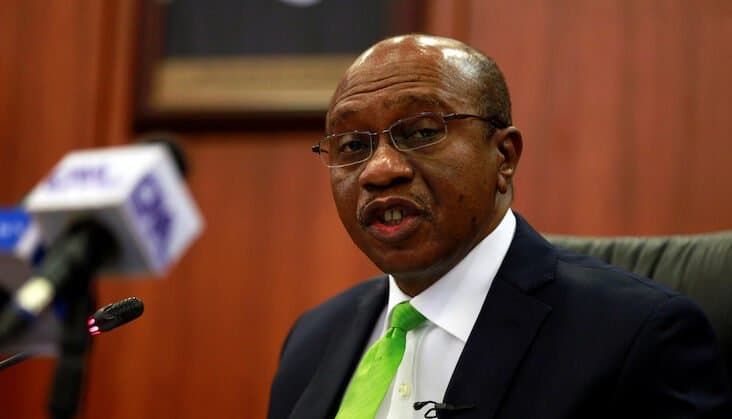What happens if CBN governor leaves?
People have been speculating about Godwin Emefiele’s potential successor as CBN governor since murmurs of his interest in becoming president of Nigeria turned into open discussions and loud noises. Since news of his alleged involvement in the Department of State Services’ (DSS) allegations of terrorism financing first surfaced, these enthralling wonderments seem to have grown […]

People have been speculating about Godwin Emefiele’s potential successor as CBN governor since murmurs of his interest in becoming president of Nigeria turned into open discussions and loud noises.
Since news of his alleged involvement in the Department of State Services’ (DSS) allegations of terrorism financing first surfaced, these enthralling wonderments seem to have grown more intense. Given that Mr Emefiele is still abroad, there seems to be an uneasy stalemate in the open disagreement between both institutions.
While some may be wondering what will happen with the CBN governor and perhaps what should be done to safeguard the integrity and stability of Nigeria’s apex bank, this author examines the more compelling query regarding the essential qualities of the would-be new governor and the necessity of proceeding cautiously in order to safeguard the bank’s reputation and guarantee system stability.
Therefore, in order to contextualise this query, it could be helpful to start by providing an explanation of what a central bank is.
According to many experts, a central bank is an independent agency that specialises in the control of money supply, conduct of monetary policy, supervision of the financial system, management of the legal tender, and engendering of macroeconomic stability in a country.
These responsibilities are given to central banks to stabilise the nation’s currency, keep unemployment low, prevent inflation, and foster economic growth. Central banks also significantly interface with international organisations like the World Bank, the International Monetary Fund (IMF), the World Economic Forum (WEF), credit rating agencies, and the like.
Given this working definition, the CBN’s daily obligations and objectives, and the looming uncertainty surrounding Mr Emefiele’s future, I believe the next governor of the CBN should be someone who has the necessary training, experience, and exposure to do exactly what central banks were created to achieve.
Therefore, rather than a seasoned commercial banker as we had with the previous and current CBN governor, the ideal Central Bank of Nigeria governor should be a renowned economist.
A person with a thorough understanding of both fiscal and monetary policy, who can effectively use the monetary tools at their disposal to steer this country toward economic growth, is needed to solve the challenges afflicting our economy and financial system.
It seems that in Nigeria, we have a tendency to equate commercial banking with central banking. However, this couldn’t be further from the truth. Someone does not comprehend monetary policy or the promotion of macroeconomic growth simply because they are connected enough to mobilise deposits at lower interest rates and turn these deposits into loans at higher interest rates.
Therefore, it is important to avoid playing political games with the appointment of the next CBN governor, should Emefiele resign or be forced to step down, and to avoid going around in circles by forcing square pegs into round holes.
A commercial banker serving as CBN governor would also have the potential for divided loyalty. Regulating Deposit Money Banks (DMBs) is one of the CBN’s primary responsibilities, however, a governor who was chosen from a DMB will have to resist the temptation to favour his former employers and to create policies that may benefit the banks but not necessarily the general public.
As a result, the sword of Damocles will always be hanging over the head of any CBN governor who has any connections to a commercial bank. The only way to eliminate this is to appoint a neutral personality with no employment affiliations to commercial banks.
In addition to the new CBN governor being a first-class economist, the individual must also possess the following attributes:
- International experience and exposure. The world is not a vacuum, and traveling is a fantastic way to learn new things. This means that the CBN governor of Africa’s largest economy will be a fantastic fit if he has experience working in global financial institutions and dealing with monetary policy at the highest level possible.
- The second attribute is insider knowledge. The new CBN Governor would undoubtedly have an advantage if he has a thorough understanding of how the CBN operates and know how to communicate well with policy stakeholders. Without a doubt, the CBN is full of people with these skills who, given the chance, will succeed.
Let us use our tongue to count our teeth, by appointing an economist to this all-important office. At least our recent history regarding banking consolidation is there to support us and lend credence to the argument.
Matthias Adeyemi Esq. wrote from Asokoro, Abuja
